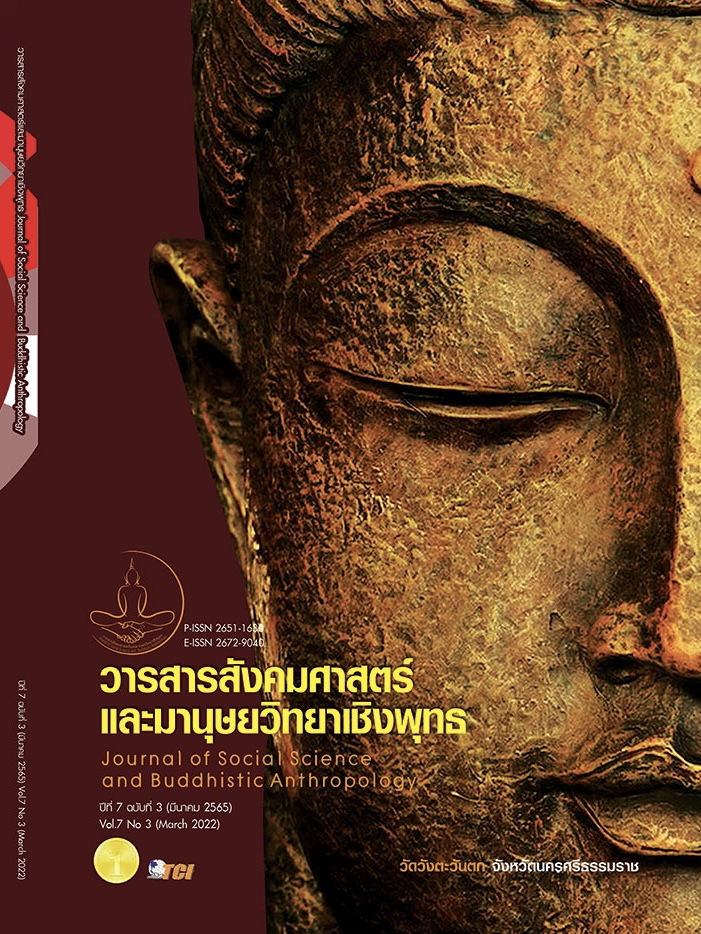WESPRA MODEL FOR STEM EDUCATION LEARNING MANAGEMENT
Keywords:
WESPRA Model, Instructional Design, Competency-Based LearningAbstract
The objectives of this research article were to 1) create WESPRA model for STEM education learning management 2) study the implementation of the WESPRA model for STEM education learning management and 3) evaluate the WESPRA model for STEM education learning management. The sample population of 12 teachers was purposively selected from Praharuthai Convent school, Assumption Convent Lopburi school and Saint Raphael School. The research instruments were a quality evaluation form for the WESPRA model user manual, a satisfaction survey towards the manual, the STEM education lesson plan evaluation form and a focus group meeting for quality certification of the model. Every instruments used in this research were checked with approved index of item objective congruence (IOC) before they were being used. The research findings were 1) the quality of WESPRA model user manual was excellent 2) the sample population’s satisfaction towards the model was excellent and the qualities of STEM education lesson plans designed with the model were excellent as they were all multi-subjects integrated with hands-on activities, student-centered and reinforcing innovative creation with concrete understanding and explicitly fostering real-life applicable knowledge and 3) the evaluation of the model from the topics in the focus group seminar agreed on the flexibility of the model which was adjustable to fit each different institution context and aligned with the 21st century learners’ competencies development.
References
กระทรวงวิทยาศาสตร์และเทคโนโลยี. (2558). เทคโนโลยีและนวัตกรรมเพื่อจังหวัด ชุมชนและท้องถิ่น. กรุงเทพมหานคร: พิมพ์ลักษณ์.
กระทรวงศึกษาธิการ. (2560). แผนการศึกษาแห่งชาติ พ.ศ. 2560 - 2579. กรุงเทพมหานคร: พริกหวานกราฟฟิค.
จำรัส อินทลาภาพร และคณะ. (2558). การศึกษาแนวทางการจัดการเรียนรู้ตามแนวสะเต็มศึกษาสำหรับผู้เรียนระดับประถมศึกษา. วารสารวิชาการเวอริเดียน อี-เจอร์นัล, มหาวิทยาลัยศิลปากร
ฉบับภาษาไทย มนุษยศาสตร์ สังคมศาสตร์ และศิลปะ, 8(1), 62-74.
ชนาธิป พรกุล. (2552). การสอน กระบวนการคิด ทฤษฎี และการนำไปใช้. กรุงเทพมหานคร: บริษัท วี. พริ้นท์ (1991) จำกัด.
มัชฌิมา เนติโกวิท. (2560). แนวทางการดำเนินงานการจัดการศึกษาแบบสะเต็มศึกษาของโรงเรียนสังกัดสำนักงานเขตพื้นที่การศึกษาประถมศึกษาชัยนาท. ใน การประชุมวิชาการและเสนอผลงานวิจัยระดับชาติ ราชนครินทร์วิจัย ครั้งที่ 9. บัณฑิตวิทยาลัย มหาวิทยาลัยราชภัฏนครสวรรค์.
สถาบันส่งเสริมการสอนวิทยาศาสตร์และเทคโนโลยี (สสวท.). (2555). ทักษะกระบวนการทางคณิตศาสตร์ (พิมพ์ครั้งที่ 3). กรุงเทพมหานคร: 3 - คิว มีเดีย.
สำนักงานคณะกรรมการพัฒนาการเศรษฐกิจและสังคมแห่งชาติ สำนักงานนายกรัฐมนตรี. (2560). แผนพัฒนาเศรษฐกิจและสังคมแห่งชาติ ฉบับที่ 12 (2560 - 2564). กรุงเทพมหานคร: สำนักนายกรัฐมนตรี.
อมวรรณ หล้าบุณคำ และคณะ. (2561). การพัฒนารูปแบบการประเมินคุณภาพการศึกษาภายในสำหรับคณะวิทยาศาสตร์ป่าไม้ของมหาวิทยาลัยแห่งชาติลาว. มหาสารคาม: ภาควิชาวิจัยและพัฒนาการศึกษา.
Capraro, R. M. et al. (2015). Increasing the STEM pipeline: Impact of multi – faceted organization. Qatar: Hamad bin Khalifa University Press.
Dhanapal, S. (2017). Student/Perception of the Supervisory Case Study at a Private Journal of Educational Management Malaysia. Scholarly Research Journal for Interdisciplinaly Studies, 3(4), 31-49.
Edward de Bono. (2008). Six frames for thinking about information. London: Random House Group company.
Joint committee on Standards for Educational Evaluation. (1980). Standards for Educational Evaluation. Chicago: Rand McNally.
Matthew McManus. (2020). The Rise of Post – Modern Conservatism. England: Palgrace Macmillan.
Quang, L. X. et al. (2019). Integrated Science, Technology, Engineering and Mathematics (STEM) Education through Active Experience of Designing Technical Toys in Vietnamese Schools. British Journal of Education, Society & Behavioural Science, 11(2), 1-12.
Roy, S. (2018). Evaluating a Research Report using Edward De Bono’s six Frames of Thinking about Information. Retrieved May 4, 2017, from http://www. srjis.com/pages/pdfFiles/1469525675
Wagner, T. (2014). The Global Achievement Gap: Why Even Our Best Schools Don’t Teach the New Survival Skills Our Children Need_and What We Can Do About it. New York: Basic Books.
Downloads
Published
How to Cite
Issue
Section
License
Copyright (c) 2022 Journal of Social Science and Buddhistic Anthropology

This work is licensed under a Creative Commons Attribution-NonCommercial-NoDerivatives 4.0 International License.









